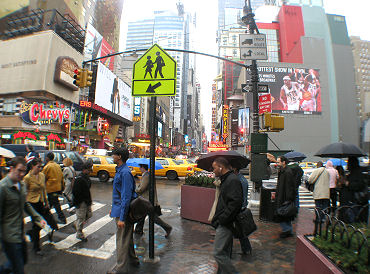So far, only three ’07 Sundance movies have inspired any thoughts of mid-range tumescence: (a) Mike Cahill‘s King of California, about a relationship between an unstable dad (Michael Douglas) and his daughter (Evan Rachel Wood) — the reasonbeing the hand of producers Alexander Payne and Michael London plus some encouraging buzz I heard about it last summer; (b) Jarrett Schaeffer ‘s Chapter 27, the long-gestating drama about what was happening in the head of Mark David Chapman (a bulked-up Jared Leto) in the days and hours leading up to his murder of John Lennon ; and (c) Brett Morgen‘s Chicago 10, a doc about the eight antiwar counter-culture protestors (Abbie Hoffman, Tom Hayden, Jerry Rubin, Bobby Seale, etc.) who were put on trial for inciting violence during the 1968 Democratic convention in Chicago — the enthusiasm is driven by Morgen’s blending of newsreel footage, animation, talking-head interviews and what I hear is an above-average rock music score plus a guy who worked on it telling me that Morgen (The Kid Stays in the Picture) “is looking to reach a whole new level with this [film].”
Month: December 2006
Murphy’s chances
Correct me if I’m wrong, but the thrust of Craig Modderno‘s 12.3 N.Y. Times piece about the Best Supporting Actor buzz around Dreamgirls costar Eddie Murphy can be summed up as follows: (a) “Talk” of Murphy’s performance as James Early, a James Brown/Otis Redding-type soul singer, is kicking around on the hot-shot journo circuit, but (b) Murphy might not win because he’s known among some of his industry peers to be a bit of an asshole (stuck up, pissed off,won’t do press).
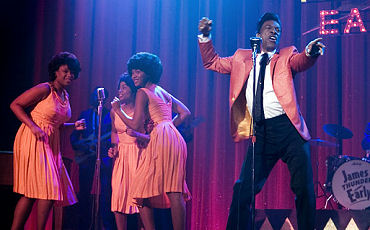
The people I’ve spoken to feel the performance is Oscar-worthy because of the vigor and stage-performing panache Murphy brings to Bill Condon‘s musical. I agree without question: Murphy’s is very winning as far as that stuff goes. It’s the spunkiest and most appealing thing he’s done in years. But the bottom-line truth — which Modderno decided not to mention — is that James Early barely exists as a developed screen character. Take out Murphy’s performing scenes and the ones in which he’s playing the tour-bus seducer, and what’s left is just a notch or two above a cameo.
Winners of supporting actor Oscars usually win because they’ve delivered at least one emotional paydirt moment (i.e., Beatrice Straight ‘s breakdown scene in Network). I challenge anyone who’s seen Dreamgirls to point out to me what Murphy’s paydirt scene is in that film. He doesn’t have a this-is-who-I really-am James L. Brooks scene, or a Cameron Crowe I-finally-know-where-I-need-to- go-with-my-life scene. Early is all about layin on the charm and puttin’ the song over on stage…along with a scene or two of despondency toward the end.
Werewolf syndrome
Ed Zwick‘s Blood Diamond (Warner Bros., 12.8) isn’t twitch-in- your-seat bad, but it definitely tries your patience in the exact same way Zwick’s The Last Samurai did. By this I mean that Zwick has repeated his decision to expose his stars — Leonardo DiCaprio and Djimon Honsou in Diamond — to the wrath of several bad guys with several machine guns blasting away and neither of them getting a scratch, just like he did with Tom Cruise in Samurai.
I wasn’t the only guy to complain about the absurdity of that climactic scene with Cruise and his Japanese comrades charging on horseback straight into a hailstorm of machine-gun bullets, but I believe I was the only columnist to come up with a theory that tried to explain it — Cruise’s character was a secret werewolf, and could only be killed with a silver bullet. (He had a kind of a lycanthropy aura with that long hair and beard.)
DiCaprio and Honsou manage the same feat. I won’t go into the dopey details, but why, I wonder, wasn’t Zwick a little more careful about flaunting the werewolf system again? Was it because other directors of violent films don’t give that much of a shit either? Mainstream action-movie heroes are always just barely escaping death…by a nose hair. They never escape with breathing room. It’s always uh-oh, oh no!, we’re done for!..and then just as the bad guys are about to pounce, they get lucky and they’re gone.
Run Through the Jungle
Run Through The Jungle
Mel Gibson has a thing — a big thing — about brutality. William Wallace’s climactic disembowling in Braveheart, the dozens upon dozens of terrible blows inflicted upon Jim Caviezel‘s Jesus in The Passion of the Christ, and now, in the obviously well made and extremely visceral Apocaylpto, all kinds of gougings, clubbings, belly-guttings, stabbings, disembowelings, animal attacks, ritualistic beheadings and tapir testicle- chewing are served up start to finish. And it’s gotten to be a bit much. Really.
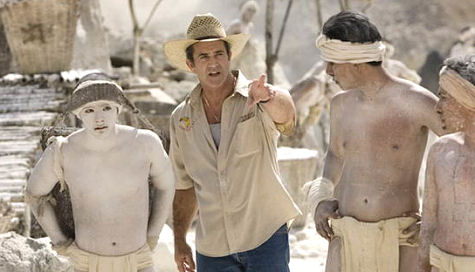
Apocalypto is basically about a small village of nice-guy natives in ancient Mexico getting attacked and rounded up by a tribe of sadistic Mayan thugs and turned into slaves, and many of them later being killed for sadistic sport. One guy named Jaguar Paw (Rudy Youngblood) manages to slip their grasp, which leads to a third act that’s all about his being hunted down and outwitting his pursuers. You know from the get-go that Youngblood — a good-looking guy with soulful eyes and a buff bod — is going to survive in the end, and that Mel’s idea is basically to put him through jungle hell.
Apocalypto closely resembles Cornel Wilde‘s The Naked Prey, which I saw years ago on the tube. Wilde’s film isn’t as graphic or atmospheric as Mel’s, but it’s fairly primal, taut and disciplined. The latter, trust me, is not a term that will readily come to mind after you see Apocalypto.
< ?php include ('/home/hollyw9/public_html/wired'); ?>
I’m not saying that the agonies depicted are excessive in the context of the story. I don’t know zip about the rituals of the ancient Mayans, and I’m not arguing with the theme of social decay or saying that present-day echoes aren’t valid. But there’s no doubt that this is first and foremost another trek through the psychology of Mel, and that there’s something very odd about that. People having been riffing about this for years, Something to do with Mel being a very hard-core, black-vs.-white, good-vs.-evil type of guy who sees some kind of link between acute physical torture and the cleansing of the spirit.
Hence, the violence in Gibsonland never really feels like it originates from any natural-feeling story or theme or exploration of character based on research or creative construction. It’s about Gibson taking a story and time and again imposing his psychology upon it — about his feeling a need to repeatedly burrow into a world of pain that is mainly about him and secondarily about everything else. That’s what artists do, obviously, but the relentlessness of the violence in his films is lacking in profundity.
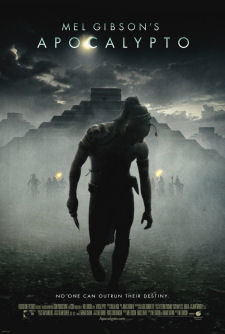
The more I watched Apocalypto the more this opinion sank in, and I just got sick of it after a while. It’s like Gibson and his co-screenwriter Farhad Safinia sat down and focused on creating a story that would heap on every ghastly form of torture, subjugation, mutilation and death known to or imagined by the most malignant Mayan psychopaths of all time. And because it’s mainly a mind-of-Mel film, I didn’t believe in the story or the characters or anything else. I just wanted it to be over. It enabled me, in fact, to see fresh virtues in the movies of Nancy Meyers.
Apocalypto is not schlock. It shows again that Gibson is nothing if not a totally go-for-broke, whole-hog, get-it-right filmmaker. He’s done an admirable job at recreating a rich, exotic, predatory world. The casting, costumes, set design, cinematography, cutting — all of it is of a very high order. But to what end?
About halfway through I started to see resemblances between Apocalypto and that old “kiki” joke. (Martin Mull told a version of it in The Aristocrats.) Two anthropo- logists are captured by a primitive tribe in some godforsaken no-man’s-land, and the chief goes up to the first guy and says, “You have a choice — death or kiki,” and the guy says, “Okay, kiki.” Hearing this, the excited tribesmen grab him and put him through one torture after another — roasting the guy alive, tearing his skin off, spearing him, gouging his eyes out, covering him with red ants and finally throwing him off a cliff into a pit of crocodiles. The chief goes to the second guy and says, “Death or kiki?” And the guy looks at his the remains of his pal and gulps and goes, “Uhm, yeah, well…I think I’ll take death.” And the chief, “Very well, death…but first, kiki!”
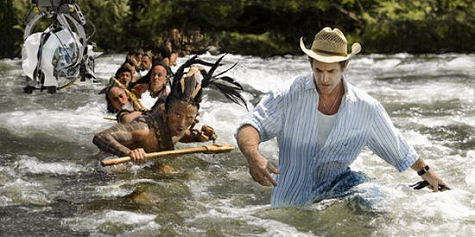
This analogy came to me somewhere between the third and the fourth severed head bouncing down the steep stone steps of a Mayan pyramid.
Variety‘s Todd McCarthy has written a rave of Apocalypto. I agree with much of what he says except for the part about “strong biz [being] possible” via “the blood-and-guts action crowd, Latinos, eco-political types and at least part of the massive The Passion of the Christ crowd.” Serious-minded film buffs will probably go. (I think they should.) But women are going to run the other way. Ditto the older sophisticated crowd. There is nothing here for Christians, and eco-political fans of Al Gore’s An Inconvenient Truth are going to take a pass also.
Gibson directed the hell out of this thing, and he deserves respect for that. But it’s a fairly unpleasant sit and is almost certainly doomed.
Beyonce/Hudson trade ads
The presumption of this Dreamgirls piece by N.Y. Post writer Mandy Stadtmiller is that Paramount/DreamWorks is making a stronger push for a Best Actress nomination for Beyonce Knowles than they are for Jennifer Hudson in the Best Supporting Actress category, despite everyone saying that Hudson has a stronger role and delivers a lot more oomph and pizazz. Stadtmiller called me and I gave her a couple of quotes, but I don’t know how many ads have been taken out or whether there’s any kind of preferential treatment going on either way. At this stage “For Your Consideration” trade ads are half about vague hunches and half about political courtesy.
The Eagle Has Landed
The air in Manhattan was mucky and clammy as I walked out of the Port Authority bus station this morning, and then it started raining off and on. In other words, perfect for an ex-New Yorker. Hollywood Elsewhere regrets yesterday’s absence, etc., but travel days are sometimes a bigger bitch than usual. Things are back on track, though, despite two hours sleep last night on the plane. As long as the Red Bull holds out things should work out. A second look at Dreamgirls happens tonight, and then a Good German junket encounter tomorrow morning.

